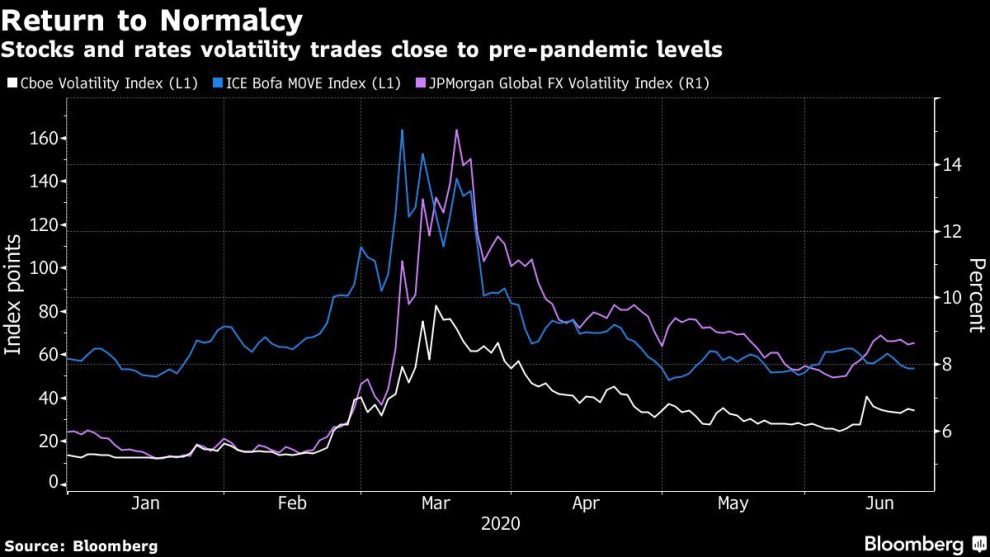
(Bloomberg) — Markets may be headed for a wake-up call as the hypothetical risks that investors brushed aside to fuel a global rally become a reality.
Some nations that eased lockdowns are seeing Covid-19 infections rise, tension between the U.S. and China is growing, corporate finances are faltering — which should make the next earnings season particularly painful. And the U.K. seems closer to a no-deal Brexit with the European Union.
“Having benefited from the spread rally by adding to credit in late March and April, we have been taking profit,” said John Taylor, who manages $6.6 billion at AllianceBernstein in London and bought corporate bonds in April. “I wouldn’t only worry about a second wave of Covid and any reversal of lockdown, but also how the economy holds up as governments start to ease back on the support.”
A day after the Bank of England slowed the pace of its quantitative-easing program, Federal Reserve data showed that its balance sheet contracted 1%, the first drop since late February.
The confluence of risks may be the jolt needed to end a global rally fueled by the trillions of dollars central banks and governments are using to buoy markets. Assets have advanced in defiance of devastating economic data, leading to a general mis-pricing of securities worldwide.
So much so that stock and currency volatility have fallen to levels last seen before the virus, and the Japanese yen — a globally recognized haven — has dipped below its five-year average, having underperformed almost all its Group-of-10 peers this quarter.
“It is concerning how few tail risks are priced,” said Jordan Rochester, a Group-of-10 currency strategist at Nomura International Plc in London. “The big one of which is policy makers potentially slowing down the stimulus. This past week we’ve actually seen the Fed’s balance sheet shrink.”
One explanation for why bullish traders are seemingly nonchalant is that, faced with unending confusion, they’re only worrying about the present.
“Markets react to the lack of medium-term visibility by shortening their investment horizon,” said Didier Saint-Georges, a member of the strategic investment committee at French asset manager Carmignac Gestion SA. “This explains the focus on the immediate recovery, and the catch up by cyclical stocks, but also the fragility of markets.”
Second Wave
It’s precisely this laser focus on the here and now that may make the convergence of negative news too difficult for bulls to ignore.
Cases of the deadly virus rose by a record for a single day on June 21, according to the World Health Organization, with California reporting a surge and Germany’s infection rate rising a third day. The coronavirus isn’t fading into the background the way some had hoped.
Also, defaults are rising, with Hilong Holding Ltd., an oil equipment and services company, becoming China’s latest borrower to miss a payment on dollar debt. And with the U.S. Presidential race heating up, a key concern is that Donald Trump may amplify his rhetoric against China to appeal to voters, fueling an already contentious trade dispute.
Markets may be starting to acknowledge a slower recovery, with companies benefiting from workers staying at home — such as Netflix Inc. and Amazon.com Inc – doing well on Monday, while gold rose and 30-year German bond yields fell below zero for the first time since May.
Given the level of mis-pricing in global assets, a correction may prove to be painful. Because the Stoxx Europe 600 rose despite a drop in profit forecasts, the gap between the two is at a record. Markets are on tenterhooks for second-quarter results, which will indicate how badly lockdowns have hurt companies.
“There’s a real risk that the longer term effects won’t just last longer than people think, but will also have a larger effect,” Kacper Brzezniak, a London-based money manager at Allianz Global Investors. “We are looking at areas where everyone — including us — assumes that the disease has been beaten.”
<p class="canvas-atom canvas-text Mb(1.0em) Mb(0)–sm Mt(0.8em)–sm" type="text" content="For more articles like this, please visit us at bloomberg.com” data-reactid=”61″>For more articles like this, please visit us at bloomberg.com
<p class="canvas-atom canvas-text Mb(1.0em) Mb(0)–sm Mt(0.8em)–sm" type="text" content="Subscribe now to stay ahead with the most trusted business news source.” data-reactid=”62″>Subscribe now to stay ahead with the most trusted business news source.
©2020 Bloomberg L.P.











Add Comment